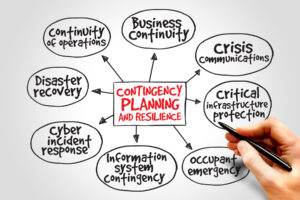In today’s fast-paced and unpredictable business environment, organizations must be equipped with robust strategies to mitigate risks and maintain operations during any disruption. In this guide, we’ll explore critical components of a business continuity program and how software plays a pivotal role in laying the foundation for a successful long-term program. Request a demo to learn more about WebEOC.
Business Impact Analysis
Business impact analysis (BIA) is a crucial step in understanding the potential consequences of disruptions on critical business processes. BIAs facilitate the collection and analysis of data related to process dependencies, recovery time objectives (RTOs), and recovery point objectives (RPOs). Adopting existing BIA methodologies is an easier way to begin understanding the business. WebEOC is designed to meet your program’s maturity level, whether it’s starting your first BIA or accommodating a granular assessment of specific business processes. After establishing a data foundation, tweak the methodology based on unique aspects of your business.
Risk Assessments
To effectively manage risks and vulnerabilities, organizations need access to comprehensive risk management assessment. This enables businesses to identify, assess, and prioritize risks across all aspects of their operations, from supply chain disruptions to cyber threats. By centralizing risk data and providing real-time insights, integrated risk management software empowers organizations to make informed decisions and proactively mitigate potential threats.
Develop Continuity Plans
Based on the findings of your risk assessments and BIAs, develop comprehensive continuity plans outlining strategies and procedures for mitigating risks and maintaining business operations during disruptions. Define roles and responsibilities for key personnel, establish communication protocols, and outline procedures for activating and executing the plan.
Incident Management and Communication Tools
During a disruption, effective communication is essential for coordinating response efforts and minimizing the impact on operations. A solution that offers a consolidated platform for incident management and communications to facilitate rapid dissemination of information and collaboration among key stakeholders, enabling organizations to quickly mobilize resources and execute their continuity plans. Any resilience platform should provide features such as enterprise alerting, facility management, and incident tracking ensuring that critical information is communicated promptly and accurately.
Testing and Exercising
Regular testing and exercising are essential for validating the effectiveness of continuity plans and identifying areas for improvement. Software platforms with enhanced simulation capabilities give organization an edge when designing and testing an enterprise’s ability to respond to any scenario. Ask about WebEOC’s SimDeck to see how it may help better prepare your organization for a crisis.
Continuous Improvement
Business continuity planning is an ongoing process that requires continuous monitoring, review, and improvement. Tools that provide easy to understand after action reports and participant surveys can make this process more effective and easier to incorporate long term. Stay vigilant to emerging threats and changes in your organization’s operations and update your continuity plan accordingly. Solicit feedback from stakeholders and incorporate lessons learned from past incidents to enhance the effectiveness of your program.
Building a resilient business continuity program is essential for safeguarding your organization’s operations and ensuring its ability to withstand and recover from disruptions. By following the steps outlined in this guide – conducting a risk assessment, performing a business impact analysis, developing a continuity plan, testing, and exercising, training and awareness, and continuous improvement – you can establish a robust continuity program that enhances your organization’s resilience and prepares it for whatever challenges lie ahead. Remember, the key to resilience is proactive planning and preparation.
Request a demo to contact Juvare’s sales team to learn how WebEOC’s unified platform accomplishes each step based on your program’s needs.



















